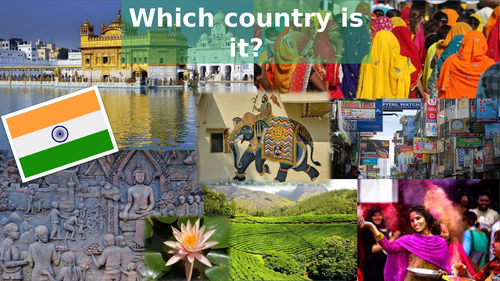

India today: Series of 6 KS2 power-point Geography lessons.
Each lesson is broken into short focused activities. There are opportunities for pupils to recall prior learning, participate in a short quiz, take notes from a YouTube clip, scrutinise and compare population graphs and weather tables (included on slides), research native animals and use maps and atlases to locate India’s key cities and geographical features. Each set of slides contain images to help pupils ‘get a feel’ for the geography of India as well as simple cultural information such as a greeting in Indian (Hindi) at the beginning and end of lessons.
Great to link with cross curricular topics such as ‘India’, ‘Rainforests’, ‘Weather’, ‘Ghandi’ etc.
Lesson 1
Learning Objectives
I must find India in my atlas.
I should recognise some of the features of India.
I could describe where India is in the world using geographical words.
Lesson 2
Learning objectives
I must be able to spot the main features of India.
I should find and label the features on my map.
I could write a description about two features.
Lesson 3
Learning Objectives
I must describe a tropical climate.
I should explain the temperature in different locations.
I could interpret the climate data and temperature chart for each month.
Lesson 4
Learning objectives:
I must explain the definition of the term ‘population’.
I should interpret the population table and identify the challenges for living in India.
I could compare population graphs for Indian cities and explain population issues.
Lesson 5
Learning Objectives
I must explain the definition of the term ‘population’, ‘tropical climate’ and ‘weather’.
I must order the ten most populated cities in India.
I should explain how the location of Indian cities affects population size.
I could explain how the weather and climate support the life of the Indian people.
Lesson 6
Learning Objectives
I must identify some features of natural beauty in India.
I should identify and research some of the areas of natural beauty which come from India.
OR
I should identify and research some of the animal, fish and birds which come from India.
Something went wrong, please try again later.
This resource hasn't been reviewed yet
To ensure quality for our reviews, only customers who have purchased this resource can review it
Report this resourceto let us know if it violates our terms and conditions.
Our customer service team will review your report and will be in touch.